Related Research Articles

The University of North Carolina is the public university system for the state of North Carolina. Overseeing the state's 16 public universities and the NC School of Science and Mathematics, it is commonly referred to as the UNC System to differentiate it from its flagship, UNC-Chapel Hill.

The University of North Carolina at Greensboro is a public research university in Greensboro, North Carolina. It is part of the University of North Carolina system. It is accredited by the Southern Association of Colleges and Schools Commission on Colleges to award baccalaureate, master's, specialist, and doctoral degrees.
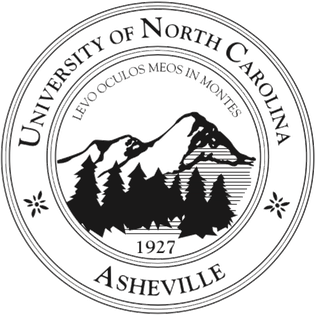
The University of North Carolina at Asheville is a public liberal arts university in Asheville, North Carolina, United States. UNC Asheville is the designated liberal arts institution in the University of North Carolina system. It is a member and the headquarters of the Council of Public Liberal Arts Colleges.

Western Carolina University (WCU) is a public university in Cullowhee, North Carolina. It is part of the University of North Carolina system.
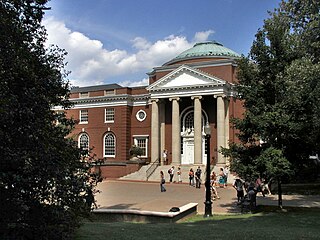
University of Mary Washington (UMW) is a public liberal arts university in Fredericksburg, Virginia. Established in 1908 as the Fredericksburg Teachers College, the institution was named Mary Washington College in 1938 after Mary Ball Washington, mother of the first president of the United States, George Washington. The General Assembly of Virginia changed the college's name to University of Mary Washington in 2004 to reflect the addition of graduate and professional programs to the central undergraduate curriculum, as well as the establishment of more than one campus. The university offers more than 60 graduate and undergraduate degree programs in three colleges: Arts and Sciences, Business, and Education.
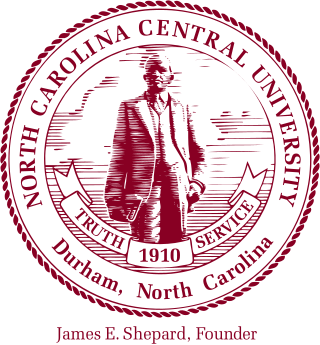
North Carolina Central University is a public historically black university in Durham, North Carolina. Founded by James E. Shepard in affiliation with the Chautauqua movement in 1909, it was supported by private funds from both Northern and Southern philanthropists. It was made part of the state system in 1923, when it first received state funding and was renamed as Durham State Normal School. It added graduate classes in arts and sciences and professional schools in law and library science in the late 1930s and 1940s.
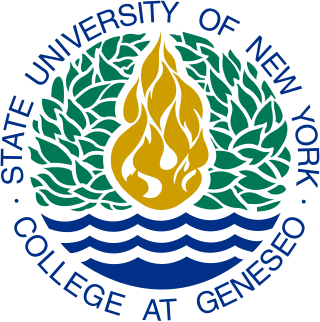
The State University of New York College at Geneseo is a public liberal arts college in Geneseo, New York. It is part of the State University of New York (SUNY) system. The college was founded in 1867 as the Wadsworth Normal and Training School before it became part of the new State University of New York system as a state liberal arts college in 1948.

Marshall University is a public research university in Huntington, West Virginia. It was founded in 1837 and is named after John Marshall, the fourth Chief Justice of the United States Supreme Court.

Sonoma State University is a public liberal arts college in Rohnert Park in Sonoma County, California, that is one of the smallest members of the California State University (CSU) system. Sonoma State offers 92 bachelor's degree programs, 19 master's degree programs, and 11 teaching credentials. The university is a Hispanic-serving institution.
Warren Wilson College (WWC) is a private liberal arts college in Swannanoa, North Carolina. It is known for its curriculum that combines academics, work, and service as every student must complete a required course of study, work an on-campus job, and perform community service. Warren Wilson is one of the few colleges in the United States that requires students to work for the institution to graduate and is one of only nine colleges in the Work Colleges Consortium.

Kutztown University of Pennsylvania is a public university in Kutztown, Pennsylvania. It is part of the Pennsylvania State System of Higher Education (PASSHE) and is accredited by the Middle States Commission on Higher Education.

Wingate University is a private liberal arts university with campuses in Wingate, Charlotte, and Hendersonville, North Carolina. It identifies as a university with "Judeo-Christian heritage."
The National Conference on Undergraduate Research (NCUR) was established in 1987 at the University of North Carolina at Asheville to promote undergraduate research in universities throughout the United States. Undergraduate students are invited to submit abstracts to present their work at NCUR, which is currently one of the events sponsored by the Council on Undergraduate Research (CUR) umbrella organization.
The following is a timeline of women's colleges in the United States. These are institutions of higher education in the United States whose student population comprises exclusively, or almost exclusively, women. They are often liberal arts colleges. There are approximately 35 active women's colleges in the U.S. as of 2021.
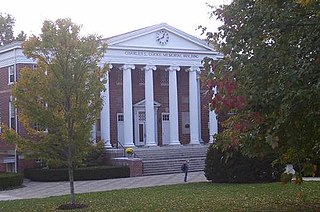
Women's colleges in the Southern United States refers to undergraduate, bachelor's degree–granting institutions, often liberal arts colleges, whose student populations consist exclusively or almost exclusively of women, located in the Southern United States. Many started first as girls' seminaries or academies. Salem College is the oldest female educational institution in the South and Wesleyan College is the first that was established specifically as a college for women, closely followed by Judson College in 1838. Some schools, such as Salem College, offer coeducational courses at the graduate level.

OBC is the oldest known collegiate secret society operating at the University of North Carolina at Asheville. Its existence has been documented as early as May 1938.
Leo Michael Lambert is the former President of Elon University. Lambert served as Elon's eighth president from 1999 to 2018 and assumed the title of President Emeritus on March 1, 2018. He was succeeded by Connie Ledoux Book.
References
- ↑ "Members by Region". COPLAC.
- ↑ Day, Terry (Jan 26, 2015). "Mansfield admitted as Pennsylvania's Representative in COPLAC". Mansfield University News. Retrieved Apr 20, 2020.